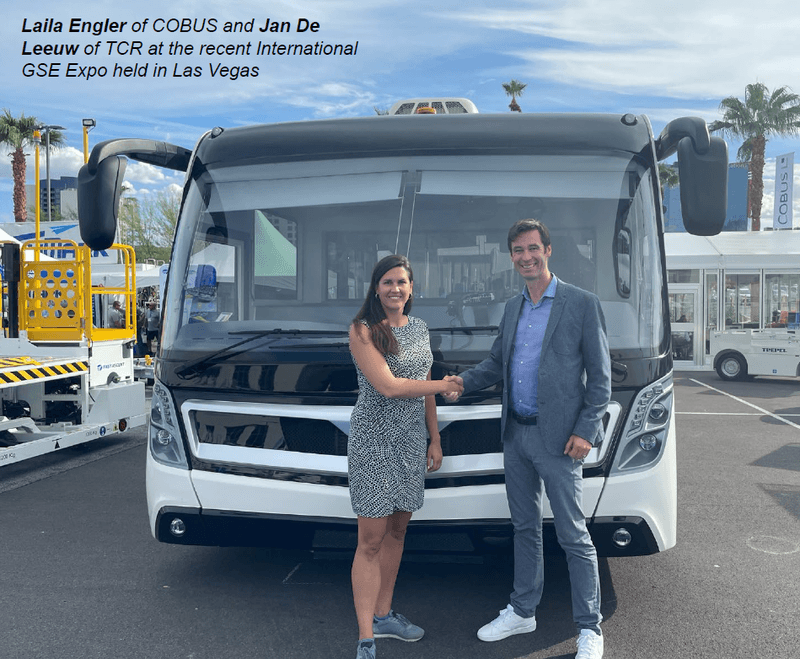TCR offers North American COBUS customers a flexible option
15/03/2022
Brussels-headquartered TCR is working hand in glove with apron bus manufacturer COBUS to offer operators of COBUS vehicles a flexible and minimal risk option for acquiring and operating these otherwise high-investment assets; they have collaborated in the European market for some time and are now extending that partnership into the North American market.

Laila Engler, head of marketing and sales manager at COBUS – a dedicated, specialist provider of airport buses – explains that the strategic partnership that exists between TCR and her company has long been in operation in Europe but that COBUS is keen to extend the value of the co-operation into the US, where the company is growing its presence. Moreover, she believes, North American airport operators and handlers – and so apron bus operators – have felt the pinch created by the collapse in the aviation industry during the Covid-19 pandemic, and a more flexible financing and operating model might be particularly attractive at this time. TCR managing director for North America Jan De Leeuw recalls that the partnership with COBUS has already worked well in Europe for more than decade, the arrangement allowing the partners to “successfully serve a large number of customers while allowing us to co-develop our skill sets. “Both TCR and COBUS have very similar cultures,” he continues: a business ethos based in no small part on offering their customers the highest possible quality of service and product, “so we can bring synergies in our combined approach.” TCR is offering its “full range of packages” for COBUS customers in the US, including operating leases and ongoing repair and maintenance support. For existing COBUS operators, TCR can buy their COBUS vehicles, lease them back to the operator for a specified time period and then take back the vehicles before redistributing them amongst other customers and geographies. Such a model means that TCR takes all the asset risk, De Leeuw points out, and in a world in which there is currently a “huge need” to reduce capital expenditure, it enables a customer bus operator to minimise its investment outlay and avoid the risks associated with having such expensive assets on its balance sheet. Like COBUS, TCR is growing its US presence. It has been in the US market since 2019 and, says De Leeuw, “We have seen a lot of traction for operating lease business there, as there has been in Europe.” Offering flexibility as well as less capital expenditure alongside the benefits of a typical TCR maintenance and repair support package, there is much to attract apron bus operators, he suggests. Having talked elsewhere with various customers about the possibilities enabled by their collaboration, both COBUS and TCR were also at the recent GSE Expo in Las Vegas promoting their partnership and the flexibility for those looking to operate COBUS buses in North America.
“We can bring synergies in our combined approach”
– Jan De Leeuw, TCR
Supporting sustainability
Both TCR and COBUS are keen to support the aviation industry’s drive towards greater sustainability, and the growth in popularity in COBUS’s electric e.COBUS is evidence of the progress that the latter is making in minimising harmful emissions. As part of its collaboration with COBUS, TCR can take a diesel vehicle from a COBUS operator, convert it to the electric variant and then place it back in TCR’s fleet stock for operating lease. The option of conversion from diesel to electric might be very popular in the US, De Leeuw believes, as might be the more general maintenance and repair package that forms such an important part of a typical TCR package. And while it is still a comparatively ‘young’ business in terms of the North American market and relies on a hybrid model of in-house and subcontracting work, TCR is quickly building up its workshop and maintenance capacity there. Four e.COBUS buses recently entered the US market at Dallas Fort Worth Airport (DFW) and this partnership with TCR represents “a good opportunity to build up a greener option for US customers”, Engler observed. 2019 was COBUS’s best-ever year in the US market. While US airline passengers may prefer fixed gate operations, Engler is in no doubt that a lack of available space at airports for building additional stands at departure terminals in combination with the budget constraints that are likely to restrict new construction at air gateways for the foreseeable future, will mean that remote stand bussing is likely to be an ever more common characteristic of US apron operations in the future.

